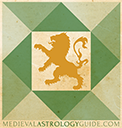Focus on Planets
If you've made it this far through the Medieval Astrology for Modern Astrologers series, you've probably noticed that the emphasis has mostly been on the planets and what they are up to in any given chart. This is normal for traditional practices of astrology which values the placements and activities of planets over that of the characteristics of the signs.
Because the planets are capable of independent motion, they are the agents of change. Change only comes through some sort of movement or progression, after all. Signs, which lack this independent motion, are not credited with manifesting or altering things, and are given something more akin to a secondary status.
This all changed with the advent of Sun sign newspaper horoscopes. Since knowledge of your Sun sign only requires knowing your birth date, it was easy for writers to produce material that everyone could identify with and access regardless of their level of knowledge about astrology. This was intensified somewhat with the introduction of more exclusively psychological focused practices of astrology which regarded the signs as a collection of character traits. Historically it was the planets that were referenced in regards to character and this is why words like "saturnine", "mercurial", "martial" and "jovial" exist in the English language with older etymological histories and why words like "Virgoan" and "Libran" are more unrecognized or newer. It wasn't common to refer to the signs as adjectives in that manner prior to the 1900s.
That planets are more important is even implied in modern astrological practices though they aren't really explored. It may tell you that you are an Aries and you should expect to experience these sorts of character traits, but that you are an Aries is because the Sun - a planet - was in the sign Aries at your birth. It isn't something that is arbitrarily determined. A sign without a point or planet within it is unremarkable at best and irrelevant at worst.
In classical astrology the signs are conceptualized as areas, environments, or kingdoms that the planets pass through. These different environments qualitatively alter the way in which planets operate. Some signs empower specific planets, some signs weaken specific planets, while other signs may augment the way a planet expresses itself. These all relate back to a planet's experience within a sign.
The idea of associating signs with areas isn't limited to their celestial position, the signs tend to represent areas in other contexts like medical astrology (where they represent areas of the body) and mundane astrology (where they represent countries or cities). The planets - by contrast - represent the things that inhabit these areas like the organs of the body or the citizens of those countries and cities. This provides planets and signs with separate ontological meanings and technical differences.
Signs have two main uses. The first is to point to a ruling planet who takes over as authority and actor. This is how house rulership functions. The cusp of a house falls within a certain sign and the planet who rules that sign now has authority over that house. The second use is the ability to alter the significations of a planet mentioned above. This occurs either qualitatively (depending on essential dignity) or functionally (as in changing the operational method). Signs do have characteristics of their own which astrologers reference whenever they discuss things like element (classically "triplicity") or modality (classically "quadruplicity") among other things. This is what determines how the planets function in various signs aside from dignity. An example would be how a planet in a fixed sign indicates something more long term or slow to develop, while a planet in a cardinal sign may indicate something that goes uncompleted.
Planets are the main focus of interpretation with both signs and houses filling more secondary roles. The houses show us the jobs that planets have and the way they link the various life topics together. The signs augment the ability for a planet to fulfill the job given to it by house rulership.
